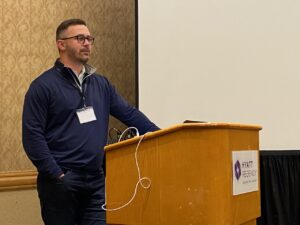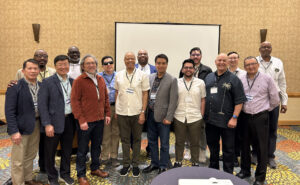
WAKE FOREST, N.C. (BP)–Southeastern Baptist Theological Seminary ethics professor Daniel Heimbach has withdrawn his membership from the Society of Christian Ethics after the group took a stand in what he calls “honoring sin over Scripture” regarding homosexuality.
Heimbach said new guidelines soon to be adopted by the society will make it impossible for any member to remain in good standing who does not affirm homosexuality. After 24 years of membership in the Society of Christian Ethics, Heimbach said the group has now gone so far in its view and defense of homosexuality as to disqualify members who defend and apply biblical morality.
The membership of the group now totals more than 1,000 people from the United States, Canada and Europe. According to its website, the group aims to “promote scholarly work in Christian ethics and in the relation of Christian ethics to other traditions of ethics … and to provide a community of discourse and debate for those engaged professionally within these general fields.”
While Heimbach said he has remained a member of the group to be a “beacon in the darkening circumstances,” the time has come for him to withdraw his membership.
“The reason I am withdrawing now, and not before, is that only now is the SCE adopting ‘standards of professional conduct’ that go so far as to disqualify membership based on defending and applying biblical morality,” Heimbach said, in reference to the amendments made to the Standards of Professional Conduct. They will be voted on in January 2009.
“It is ironic that, having assiduously avoided favoring any one moral understanding over others for nearly 50 years, the SCE should now see no problem with enforcing one view over others by conditioning membership on presuming to accept the moral legitimacy (requiring all to actually ‘respect’ and ‘honor’) of self-justified character and behavior God declares to be categorically wicked,” Heimbach said.
The new proposed language to the society’s standards of profession conducts says in part, “[I]n activities that occur under the auspices of the Society we will neither practice nor tolerate any form of harassment or unjust discrimination, in deed or word, based on race, sex, nationality, ethnicity, religious community, sexual orientation, age, or physical condition.” In another section the new standards read, “We recognize that each of us has a right … to make our own decisions and keep our own commitments in matters concerning romantic and sexual relationships.” The term “sexual orientation” includes homosexuality and lesbianism.
Said Heimbach, “It allows no ‘unjust’ discrimination ‘based on’ sexual orientation. Since ‘unjust’ has no objective reference this disallows moral criticism of homosexual activity.”
The new version also states, “We commit ourselves to honoring the physical, moral and sexual integrity of all SCE members.” The word “honoring,” Heimbach said, essentially means “accepting.”
“This could disqualify any who do not accept homosexuality as morally neutral,” he said.
The new terms, Heimbach said, give ethicists no grounds to say anyone else is morally wrong because of who they believe they are.
“I have never questioned the value of bringing together scholars approaching Christian Ethics from different backgrounds,” Heimbach said. “I am withdrawing membership at this point because it seems to me the SCE is disqualifying participation by professionals who seek to remain faithful to the origin of our field,” Heimbach said. “The new standards are so detached from treating the Bible as a revelation of transcendent moral authority there is no longer any objective basis for giving fixed moral meaning to terms like ‘the dignity of persons,’ or ‘just relations,’ or ‘responsibility,’ or even to what ‘Christian’ means in the title of the society.
“It is bad enough that the SCE should for so long have rejected favoring any moral view over others. But it is so much worse that, on selecting one view over others in the name of setting standards of ‘professional conduct,’ the SCE should now prefer a view honoring sin and condemning Scripture over one honoring Scripture and condemning sin.”
In his resignation letter to Stewart Herman, executive director for the society, Heimbach wrote, “All variations of sexual orientation must be treated as worthy of ‘respect’ and moral ‘honor,’ which can only mean that failing to accept anything defended under that rubric will be cause for disciplinary action.”
Heimbach also wrote, “I have read carefully through the wording of the new standards and am greatly disturbed by the postmodern language that, while drippingly subjective, nevertheless allows no dissent with treating ‘sexual orientation’ as a morally neutral category.”
–30–
Lauren Crane is a writer for Southeastern Baptist Theological Seminary in Wake Forest, N.C.
















